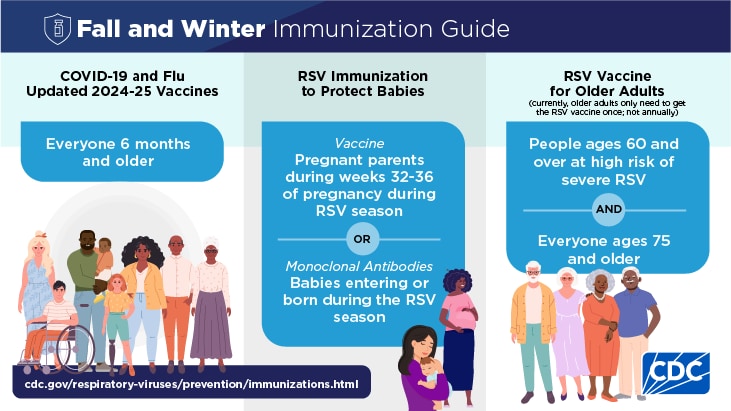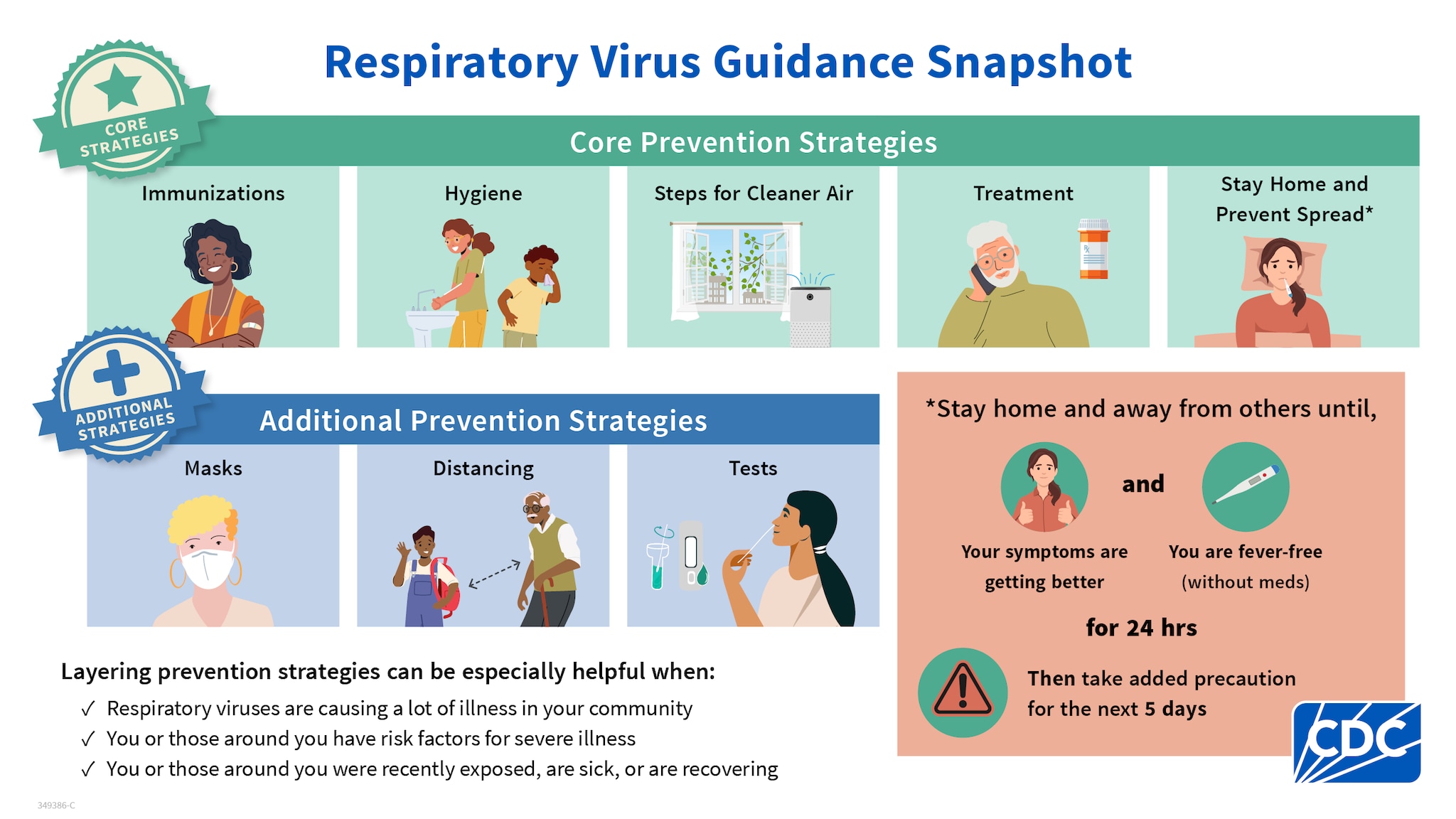Key points
- Respiratory viruses like flu, COVID-19, and respiratory syncytial virus (RSV) can lead to hospitalization and even death.
- Vaccination is a core strategy for lowering your risk of hospitalization, long-term health impacts, and death from these viruses.
- Treatments for flu and for COVID-19 can lessen symptoms and shorten the time you are sick.
- Keep reading to learn how to help keep yourself and others healthy this fall and winter virus season.
Current situation
Respiratory viruses situation summary
Respiratory viruses remain important public health threats. Last season, over a million people were hospitalized and over 100,000 died from diseases caused by respiratory viruses. In fact, RSV is the leading cause of infant hospitalization in the United States.
This fall and winter virus season, protect yourself and your loved ones. This is especially important for certain groups of people who are at higher risk for severe disease from these viruses.
Find illness levels in your area
What you should do

Make a plan to get vaccinated
Vaccination against flu, COVID-19, and RSV is a core strategy for lowering your risk of hospitalization, long-term health impacts, and death from these viruses. The good news is that you can get these vaccines at the same time.
COVID-19 and flu vaccines: CDC recommends the seasonal flu vaccine and the 2024-2025 COVID-19 vaccine for everyone ages 6 months and older. Vaccination is especially important for people who are at increased risk of severe disease, such as adults 65 years and older, people with certain health conditions, nursing homes residents, and pregnant people.
CDC now recommends that people that are immunocompromised or 65 years and older receive another dose of the 2024-2025 COVID-19 vaccine 6 months after receiving their first dose.
RSV vaccines for older adults: CDC recommends RSV vaccines to protect adults ages 75 years and older and adults ages 60-74 years with certain health conditions and those who live in nursing homes. Currently, older adults only need to get the RSV vaccine once, not annually.
RSV immunizations to protect babies: There are two ways to protect babies when they are most at risk of getting severe RSV disease.
- Vaccination during pregnancy (Pfizer Abrysvo only) which will provide the infant with protection against severe RSV
- Immunization of the newborn or baby with an RSV protective antibody called nirsevimab.
Each immunization offers important benefits
COVID-19 vaccines and Flu vaccines:
- Cut your risk of hospitalization by about half.
- Make most infections less severe, helping you get back on your feet sooner.
COVID-19 vaccines also reduce your chance of suffering the effects of Long COVID.
- Keep reading: Uninsured? Free COVID-19 vaccines may still be available.
- Can reduce a baby's chances of hospitalization by over 90%.
- Can reduce the risk of hospitalization in older adults by over 70%.
Vaccines are widely available.
Layer prevention strategies

CDC's Respiratory Virus Guidance recommends that all people use core prevention strategies.
The core prevention strategies include:
- Staying up to date with immunizations.
- Practicing good hygiene.
- Taking steps for cleaner air.
When you have a respiratory virus:
- Use precautions to reduce the spread, such as staying home and away from others.
- Seek health care for treatment if you have risk factors for severe illness.
Additional prevention strategies include masking, distancing, and testing. Layering these additional prevention strategies is especially helpful when:
- Respiratory virus levels are higher in your community.
- You or people around you have risk factors for severe illness.
- You or people around you were recently exposed, sick, or are recovering.
Spotlight on treatment
Treatments for flu and for COVID-19 can lessen symptoms and shorten the time you are sick. They also may reduce the risk of complications, including those that can result in hospitalization. For people with risk factors for severe illness, early treatment can mean having milder illness. Treatment for COVID-19 can cut your risk of hospitalization in half or more.
- Know the treatment options for flu and COVID-19 before you get sick.
- Seek health care right away for treatment if you believe you may have a respiratory virus and you have risk factors for severe illness.
- Testing can help. Home tests for both COVID-19 and flu are available, including some that can test for both flu and COVID-19.
